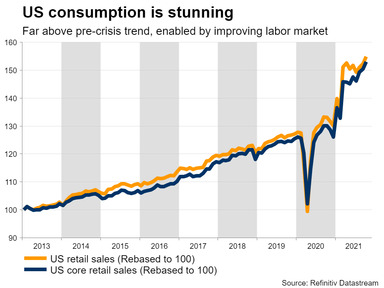A friend said, it’t confession time on op the on the opinion page of NYT, yes.
Here’s Krugman on inflation:
‘In early 2021 there was an intense debate among economists about the likely consequences of the American Rescue Plan, the $1.9 trillion package enacted by a new Democratic president and a (barely) Democratic Congress. Some warned that the package would be dangerously inflationary; others were fairly relaxed. I was Team Relaxed. As it turned out, of course, that was a very bad call.
But what, exactly, did I get wrong? Both the initial debate and the way things have played out were more complicated than I suspect most people realize.’
(…)
‘So here’s the odd thing: The multiplier on the rescue plan does, in fact, seem to have been relatively low. A lot of consumers savedthose checks; state and local government spending rose by less than one percent of G.D.P. Employment is still below its prepandemic level, and real G.D.P., while it has recovered to roughly its prepandemic trend, hasn’t shot above it.
Yet inflation soared anyway. Why?
Much, although not all, of the inflation surge seems to reflect disruptions associated with the pandemic. Fear of infection and changes in the way we live caused big shifts in the mix of spending: People spent less money on services and more on goods, leading to shortages of shipping containers, overstressed port capacity, and so on. These disruptions help explain why inflation rose in many countries, not just in the United States.’
(…)
‘Even so, historical experience wouldn’t have led us to expect this much inflation from overheating. So something was wrong with my model of inflation — again, a model shared by many others, including those who were right to worry in early 2021. I know it sounds lame to say that Team Inflation was right for the wrong reasons, but it’s also arguably true.
One possibility is that historical experience was misleading because until recently the economy was almost always running a bit cold — producing less than it could — and inflation didn’t depend much on exactly how cold it was. Maybe in a hot economy the relationship between G.D.P. and inflation gets a lot steeper.
Also, disruptions associated with adjusting to the pandemic and its aftermath may still be playing a large role. And of course both Russia’s invasion of Ukraine and China’s lockdown of major cities have added a whole new level of disruption.
Looking ahead, the economy is currently cooling off — the decline in first quarter G.D.P. was probably a quirk, but overall growth seems to be running below trend. And private sector economists I talk to mostly believe that inflation either has already peaked or will peak soon. So things may seem less puzzling a few months from now.
In any case, the whole experience has been a lesson in humility.’
Read the article here.
Many of us need lessons in humility, but since inflation in Europe is high as well, June 2022, 8.6 in EU, 9.1 in US, it’s not just the American Rescue Plan that caused this. European countries pumped money into the economy after Covid to avoid a big recession and a return to the 1930’s, unrest and extremism. Dictatorship and scapegoats. Violence and war.
But I’m happy to see that Krugman is pointing out that the recession will soon be over, he was wrong, but not completely wrong. Humility should never be more than a cold appetizer.
